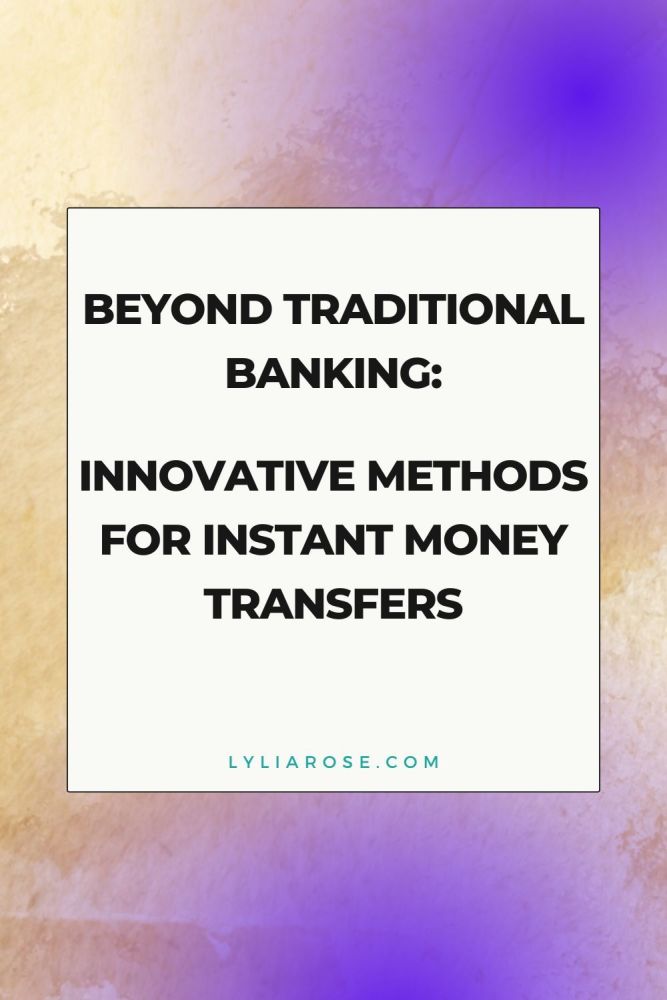Beyond Traditional Banking: Innovative Methods for Instant Money Transfers
Posted on
In the evolving world of finance, the traditional approach to money management and transfers is now being reshaped by innovative solutions. In recent years, we have seen new technology emerge, pushing beyond the basic necessities of banking. The rise of digital banking has introduced new ways to make our transactions more accessible, faster and often cheaper than using traditional banking. So, let’s have a look at some of the most innovative instant money transfer methods currently available for consumers.

Understanding traditional bank transfers
In order to grasp how instant transfers are facilitated through various methods, it is important to first get a grasp on how traditional bank transfers work. Traditional banking relies heavily on established systems, involving several layers of communication, intermediaries, and regulations.
Within the United Kingdom, sort codes play a significant role in domestic transfers, for instance. A bank sort code is a six-digit number, which identifies both the bank and the branch where a bank account is held. It is typically split into two digits followed by a hyphen, such as 12-34-56. This numerical system is pivotal to the banking infrastructure in the UK and Ireland.
On an international scale, the International Bank Account Number (IBAN) and the Society for Worldwide Interbank Financial Telecommunication (SWIFT) codes take centre stage. Introduced to standardise the identification of bank accounts across countries, the IBAN is a series of alphanumeric characters that denote a specific account held at a bank. It starts with a two-letter country code, followed by two check digits and up to thirty alphanumeric characters for the domestic bank account number. This unique combination allows banks to process transfers with less risk of error.
SWIFT codes, comprising 8-11 alphanumeric characters, are essentially the international equivalents of sort codes, used globally to identify banks during international transactions. They enable money transfers across borders, serving as a lifeline for global commerce and personal finance alike.
Innovative methods for instant money transfers
While highly reliable, conventional money transfer methods also involve many constraints, creating demand for more efficient and cost-effective solutions. This has sparked the development of new technologies, offering innovative methods for instant money transfer, and completely redefining the landscape of banking. Here are the key technologies you should know about:
Fintech banking
Neobanks, also known as challenger banks, have taken the financial world by storm. These digitally native banks, including brands such as Revolut, Wise, Starling, and N26, are reshaping the paradigm of banking. Without physical branches, they operate on lower overheads, passing the savings onto the customers in the form of lower fees.
Wise (formerly TransferWise), for instance, uses a smart new approach for international transfers. It maintains bank accounts in multiple countries, allowing it to process a transfer as two local transactions instead of one international one. This clever bypassing of SWIFT for most transfers allows Wise to offer faster, cheaper transactions.
Fintech banking is increasingly popular amongst users, who are having to regularly exchange currencies and make international transfers. Such digital banking platforms as Revolut offer instant transactions and low fees, allowing you to hold money in 30+ different currencies. These solutions are not just used by working professionals, but also increasingly picked up by holiday-makers, who can make instant transfers in foreign currencies while travelling abroad.
Currency brokers
Currency brokers offer another innovative way to transfer money. Companies such as Moneycorp have made a name in the market by focusing on foreign exchange and international payments. Currency brokers essentially work as an intermediary between you and the foreign exchange market, where you are offered a rate based on live currency market updates, which they then “buy” for you upon your approval. Thanks to smart digital platforms, this process is happening instantaneously.
Currency brokers typically have more competitive exchange rates and lower fees compared to traditional banks by leveraging their expertise in currency markets. The entire process is designed to be seamless and efficient, ensuring your money reaches the intended destination swiftly and with minimal cost. This, coupled with their ability to offer personalised services, makes currency brokers an attractive choice for individuals and businesses dealing with foreign transactions.
Cryptocurrency
The rise of cryptocurrencies like Bitcoin or Ethereum has introduced a whole new era for money transfers. These digital currencies enable a peer-to-peer approach, bypassing banks and intermediaries altogether. The decentralised nature of cryptocurrencies allows for quick, and in many cases, cheaper international transfers.
However, it's worth noting that while the regulations for digital currencies are increasing, there is a lot of uncertainty surrounding cryptocurrency. The biggest concerns for users are security threats and significant fluctuations in the value of different cryptocurrencies. Therefore, the use of a reliable platform that facilitates cryptocurrency storage and transfers, such as Nebeus or Coinbase, is highly recommended.
Final thoughts
Innovative methods of money transfer are reshaping the financial landscape, offering a real alternative to traditional banking. Fintech banking, currency brokers, and cryptocurrency transfers are at the forefront of this movement, each presenting unique solutions to the challenges posed by traditional methods. As technology continues to advance and regulations evolve, however, we will be seeing even more innovative solutions, promising faster, cheaper, and more accessible money transfers.

